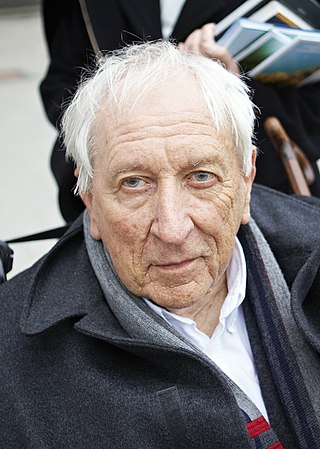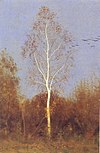Related Research Articles
Jeremy Halvard Prynne is a British poet closely associated with the British Poetry Revival.

Pascale Petit, is a French-born British poet of French, Welsh and Indian heritage. She was born in Paris and grew up in France and Wales. She trained as a sculptor at the Royal College of Art and was a visual artist for the first part of her life. She has travelled widely, particularly in the Peruvian and Venezuelan Amazon and India.
John Kinsella is an Australian poet, novelist, critic, essayist and editor. His writing is strongly influenced by landscape, and he espouses an "international regionalism" in his approach to place. He has also frequently worked in collaboration with other writers, artists and musicians.

Tomas Gösta Tranströmer was a Swedish poet, psychologist and translator. His poems captured the long Swedish winters, the rhythm of the seasons and the palpable, atmospheric beauty of nature. Tranströmer's work is also characterized by a sense of mystery and wonder underlying the routine of everyday life, a quality which often gives his poems a religious dimension. He has been described as a Christian poet.

Anne Stevenson was an American-British poet and writer and recipient of a Lannan Literary Award.
Timothy Brendan Kennelly, usually known as Brendan Kennelly, was an Irish poet and novelist. He was Professor of Modern Literature at Trinity College Dublin until 2005. Following his retirement he was a Professor Emeritus at Trinity College.
Ursula Askham Fanthorpe CBE FRSL was an English poet, who published as U. A. Fanthorpe. Her poetry comments mainly on social issues.

Forrest Gander is an American poet, translator, essayist, and novelist. The A.K. Seaver Professor Emeritus of Literary Arts & Comparative Literature at Brown University, Gander won the Pulitzer Prize for Poetry in 2019 for Be With and is chancellor of the Academy of American Poets and a member of the American Academy of Arts and Sciences.
Kent Johnson was an American poet, translator, critic, and anthologist. His work, much of it meta-fictional and/or satirical in approach, has provoked a notable measure of controversy and debate within English-language poetry circles.
Bloodaxe Books is a British publishing house specializing in poetry.
Carole Satyamurti was a British poet, sociologist, and translator.
Lyubov Makarivna Sirota is a Ukrainian poet, writer, playwright, journalist and translator. As a former inhabitant of the city of Pripyat and an eyewitness of the Chernobyl disaster, she has devoted a great part of her creative output to the 1986 catastrophe. She writes in both Ukrainian and Russian, and also translates from Ukrainian into Russian and vice versa. Her poems have been translated into many languages, including English.
Nationality words link to articles with information on the nation's poetry or literature.
Neil Astley, Hon. FRSL is an English publisher, editor and writer. He is best known as the founder of the poetry publishing house Bloodaxe Books.

James Byrne is a British poet and translator who edited The Wolf magazine from 2002 to 2017. He was born in Buckinghamshire in 1977. His most recent poetry collections include Everything Broken Up Dances, published by Tupelo Press in the United States and White Coins, both in 2015. Other published collections include Blood/Sugar by Arc Publications in 2009, and he has also published pamphlets, including SOAPBOXES and Myth of the Savage Tribes, Myth of Civilised Nations, a collaborative work with the poet Sandeep Parmar. For many years James has been consistently talked of as 'one of the leading poets of his generation', endorsed by The Times as one of the 'ten rising stars of British poetry' in April 2009. He lives in England after two years in New York City, where he received a Stein scholarship and an MFA from New York University. He was the poet in residence at Clare Hall, University of Cambridge, from 2011 to 2012 and is a senior lecturer at Edge Hill University, where he teaches poetry and poetics.
Jane Joritz-Nakagawa (中川ジェーン), born in 1960, is an avant-garde, expatriate American poet and essayist who resides in Japan. She is the author of volumes of poetry, poetry chapbooks, and a poetry broadside. Her poems have appeared in print and online journals and anthologies published in Japan, the United States, United Kingdom, Canada, Australia and a number of other countries. Her work is archived in the University of Chicago library's special collection of poetry from Japan.
Jim Burns is an English poet, writer and magazine editor. He was born in Preston, Lancashire, in 1936.
Madhur Anand is a Canadian poet and professor of ecology and environmental sciences. She was born in Thunder Bay, Ontario and lives in Guelph, Ontario.

Mario Petrucci (1958) is a British-Italian poet, literary translator, educator and broadcaster. He was born in Lambeth, London and trained as a physicist at Selwyn College in the University of Cambridge, later completing a PhD in vacuum crystal growth at University College London. He is also an ecologist, having a BA in Environmental Science from Middlesex University. Petrucci was the first poet to be resident at the Imperial War Museum and with BBC Radio 3. He has broadcast extensively on radio, including the BBC’s Kaleidoscope, London Nights, Sunday Feature, Night Waves, The Verb and BBC World Service, as well as on BBC TV.
Anne Frances Elvey is an Australian academic, editor, researcher and poet.
References
- ↑ "Mario Petrucci". Archived from the original on 2007-02-03. Retrieved 2007-11-30.
- ↑ "Enitharmon Press". Archived from the original on 2007-08-22. Retrieved 2007-11-30.
- ↑ "The Green Book of Poetry". Frontier Publishing.
- ↑ Ecopoetics
- ↑ Mambrol, Nasrullah (2021-02-18). "ECOPOETICS". Literary Theory and Criticism. Retrieved 2022-11-05.
- ↑ "Bloodaxe Books: Title Page > Neil Astley: Earth Shattering". Archived from the original on 2007-08-18. Retrieved 2007-11-30.
- ↑ "Welcome octopusmagazine.com - BlueHost.com". Archived from the original on 2018-05-31. Retrieved 2007-11-30.
- ↑ "The Poetry Society (Poetry Class)". Archived from the original on 2019-04-20.
